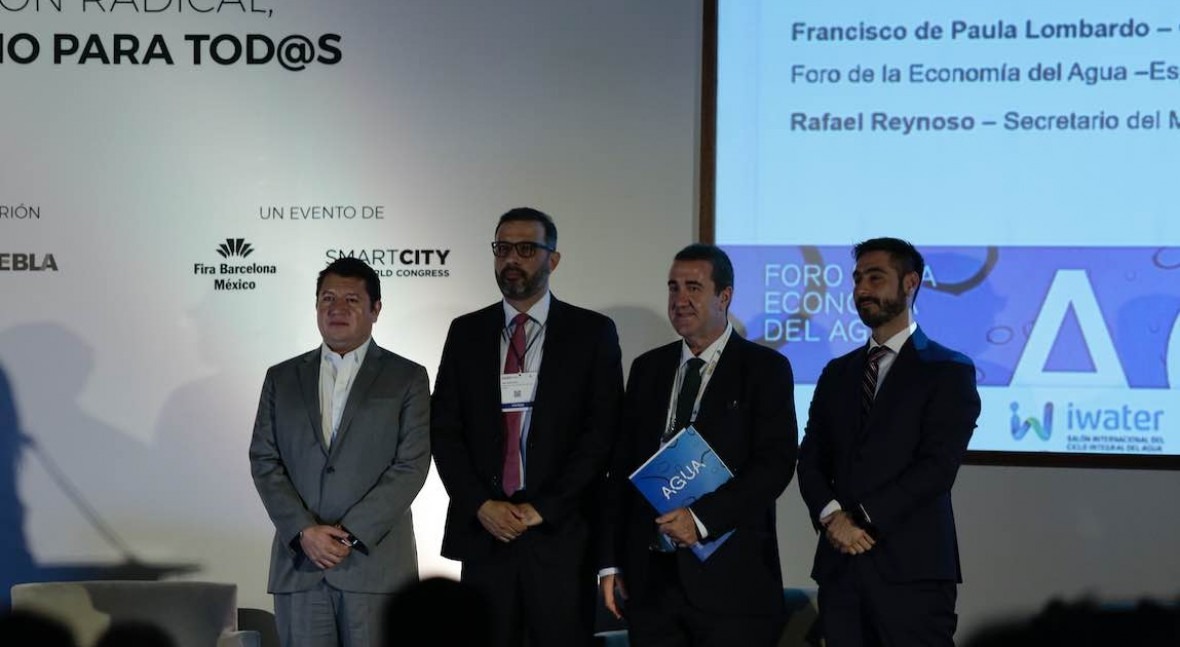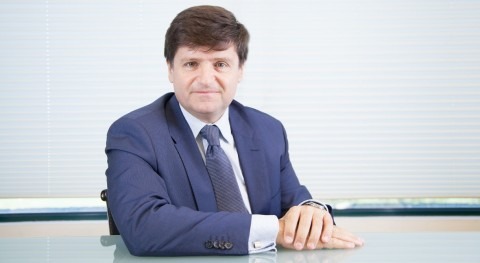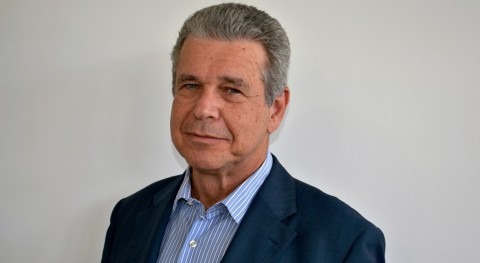Attended by hundreds of people, the 11th Water Economy Forum (Foro de la Economía del Agua), held yesterday in the iWater hall of the Smart City Expo Latam Congress, organised by Fira Barcelona-Mexico in Puebla, Mexico, highlighted the need to ensure the universal human right to water, which requires, among other things, the provision of basic drinking water and sanitation services in particularly vulnerable areas, in line with Sustainable Development Goal 6 (SDG 6) of the United Nations' Agenda 2030.
'It is urgent for water to become part of the political agenda of cities and countries, as a core issue, to address humankind's great water challenges'
Declared the Secretary of Environment of the State of Puebla, Rafael Reynoso, and Julio Adolfo Fierro Kauffmann, local director of Mexico's National Water Commission, CONAGUA, during the opening of the Water Economy Forum; Manuel Redondo, President of Fira México, who also took part in the opening, welcomed the celebration of this Water Economy Forum as part of the Smart City Expo Latam Congress, given the importance of water in the context of smart cities.
Water management is crucial, noted Francisco Lombardo, President of the Water Economy Forum, and he stressed the need to manage an essential good such as water in the current context: the World Economic Forum in Davos, in its Global Risks Report 2019, and for the third time in a row, warns about 7 potential risks directly related to water and the environment. 'The first two relate to the environment and climate change. The third and sixth ones, to natural disasters, and the eighth one, to the loss of biodiversity. Water is a core theme for all of them, either lack of water or excess thereof, such as in floods', pointed out Francisco Lombardo.
And he concluded 'it is urgent for water to become part of the political agenda of cities and countries, as a core issue, to address humankind's great water challenges'.
Moreover, the economist and Director of the Water Economy Forum, and also member of the advisory council to the United Nations Development Program (UNDP) for Latin America, José Carlos Díez, emphasised that 'climate change has turned water into one of the great challenges of the 21st century; however, at the Water Economy Forum, we think this is also an opportunity to create quality employment, and that it should be part of the economic development agenda of Latin American countries'.
Sanitation, management, challenges, technology and digitalization
With its first international event, the Water Economy Forum reached its 11th edition, held yesterday at the iWater hall of the Smart City Expo Latam Congress. The event was organised into 4 discussion panels with outstanding speakers. Sanitation, management, challenges, technology and digitalization were some of the issues discussed during the 11th Water Economy Forum.

According to the WHO and UNICEF, thousands of millions of people worldwide and also in Latin America still have no access to basic drinking water and sanitation services. In rural areas, the proportion of the population without access to safely managed services is larger than in cities (4 out of 5 people who do not have access to an improved drinking water source and 3 out of 4 people who do not have improved sanitation live in rural areas). The global gap is even larger in regions such as Latin America and the Caribbean, Asia and Africa, revealing huge development inequalities. This has weakened rural sanitation policies and the configuration of urban and rural services in a more appropriate way. 'It is imperative to progress toward a water management model that leaves no one behind' stated Cesarina Quintana, Regional Coordinator, Water and Sanitation for All (WSA), present at the first panel organised by the Water Economy Forum, on 'the challenge of providing water and sanitation in suburban and rural areas of Latin America'.
'Water Security in Latin American cities' has been another of the themes considered at the Water Economy Forum, as the real goal of water policy, in a mandatory context of climate change adaptation.
In this regard, 'globally the most important challenge for water security is resilience to the effects of climate change, as well as fulfilling the Sustainable Development Agenda 2030 of the United Nations. Providing universal access to water and sanitation for every home, taking into account that large cities across the world are growing very fast', noted Rogerio Koehn, participant in the Water Economy Forum.

'Resilience versus irreversibility in water services management in large metropolitan areas: Mexico City, Lima or São Paulo', was another of the core issues discussed yesterday at the Water Economy Forum, by a panel moderated by Alejandro Maceira, Director of the prestigious publication iAgua. The panel pointed out that, in large population centres such as Mexico City, Lima or São Paulo, it is necessary to increase resilience against drought risks, and addressing structural water scarcity will only be possible with interventions at the basin level, preserving natural water resources, and combining conventional (grey) infrastructure with nature-based approaches.
In the last session, moderated by the economist and Director of the Water Economy Forum, and also member of the advisory council to the United Nations Development Program (UNDP) for Latin America, José Carlos Díez, we heard from Raanan Adin (President, Israel Water Association (IsWA) and CEO of Adin Holdings Water Consulting (AH); Jesús Torres Roldan (Director General of TECSA and IACMEX); and Maurizio De Stefano (expert in innovation and digital strategy), experts who have discussed 'the technology revolution in the water sector'. The fact is the industrial revolution 4.0 is arriving late in many aspects to low and middle income countries, and crucial sectors such as water. The digitalization of the economy in general and the water sector in particular, and the use of technologies such as big data, artificial intelligence and automated response, augmented reality, macro data management, the Internet of Things, etc., offer significant opportunities for the urban water sector and water security at the basin level.
About the Water Economy Forum
The Water Economy Forum is an initiative supported by the University of Alcalá (Spain) to promote discussion and dialogue about water in Spain, with the participation of the University of Granada (Spain) and McGraw-Hill publishing.








